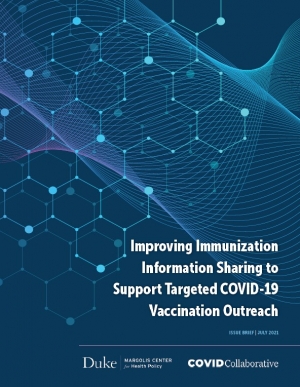
Policy Brief
Improving Immunization Information Sharing to Support Targeted COVID-19 Vaccination Outreach
With continued efforts to vaccinate the U.S. adult population, as well as children and adolescents as the COVID-19 vaccine is authorized in younger age groups, the Biden Administration has announced a renewed effort to expand vaccine accessibility and build vaccine confidence by engaging communities across the country. Initial phases of vaccine distribution often emphasized speed of delivery through mass vaccination sites and other high-efficiency approaches. However, as vaccine supply has outpaced demand in many areas, state and local officials are shifting strategies to reach individuals who have not yet been vaccinated, continue to experience barriers to access, or require additional outreach from trusted messengers to build vaccine confidence. Moving forward, achieving widespread and equitable vaccine access for all Americans will require expanding partnerships and accessibility through community organizations, schools, churches, workplaces, primary care providers, and community settings, as well as employing targeted, data-led strategies to reach unvaccinated populations.
As efforts to push vaccines into communities continue, health care partners—including health insurance providers, health care providers, health maintenance organizations (HMOs), home care agencies, area agencies on aging, and entities like regional health improvement organizations and Health Information Exchanges (HIEs)—can play a critical role in efficiently identifying and engaging unvaccinated populations with established connections to health systems.1 With aligned incentives for improving health and reducing overall health costs for patient populations, many health care partners are able to leverage trusted patient relationships, data systems and analytic expertise, and care coordination experience to augment state vaccination outreach efforts with high-touch efforts to connect individuals to vaccines. Although health care partners may have access to limited patient vaccination data through claims or electronic health records (EHRs), the ability to do efficient and effective outreach to unvaccinated individuals across a provider or health plan patient population will depend on timely and complete access to COVID-19 vaccination data from state immunization information systems (IISs). The ability to share state IIS data and support bi-directional information exchange on a population basis with key health care partners is limited and variable across jurisdictions, with significant legal and regulatory, technological, and logistical challenges that have hindered information sharing to date. To support state leaders in developing data-driven partnerships that can augment vaccination outreach efforts, this issue brief will:
- Identify current barriers to sharing immunization information with health care partners
- Highlight innovative strategies for leveraging state immunization data and health care partners to support targeted outreach efforts
- Provide considerations for state and federal leaders for strengthening IISs and supporting improved outreach, coordination, and information sharing with health care partners
Duke-Margolis Authors

Katie Huber, MPH
Policy Research Associate

Mark McClellan, MD, PhD
Director of the Duke-Margolis Institute for Health Policy
Robert J. Margolis, MD, Professor of Business, Medicine and Policy
Margolis Executive Core Faculty
